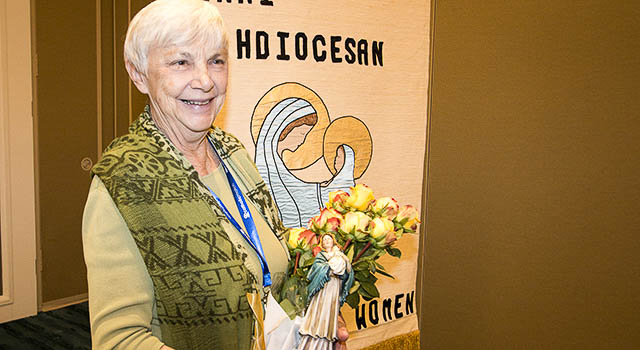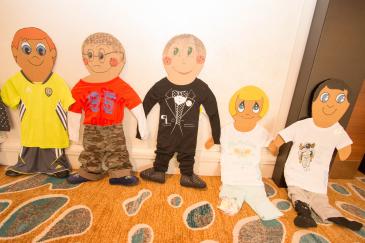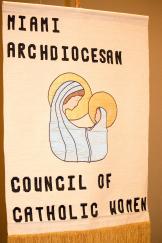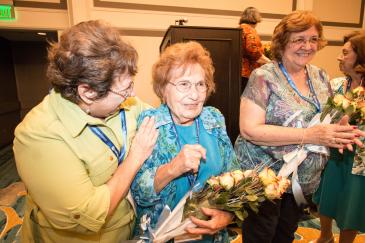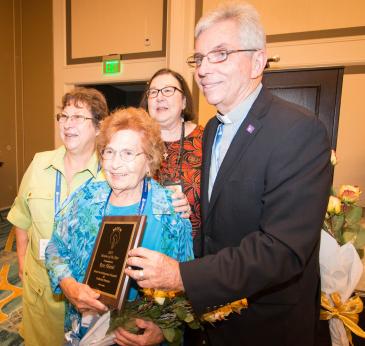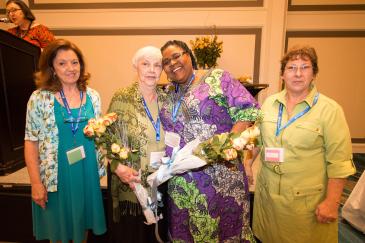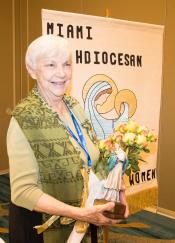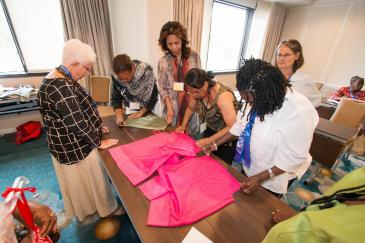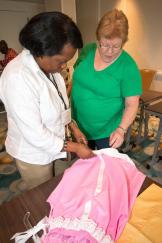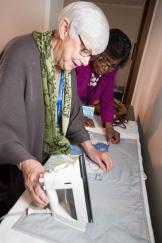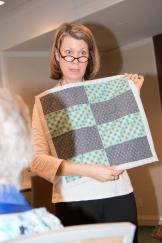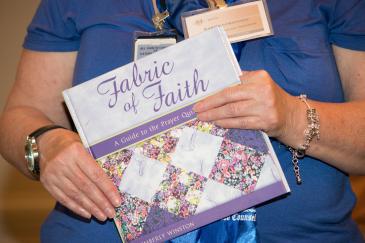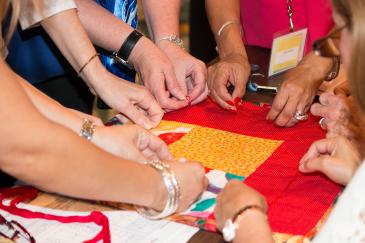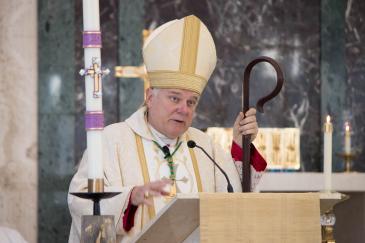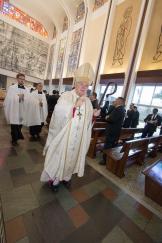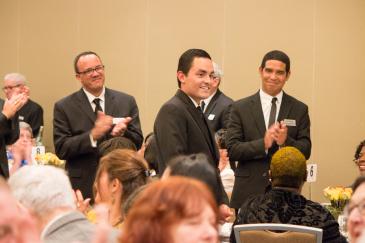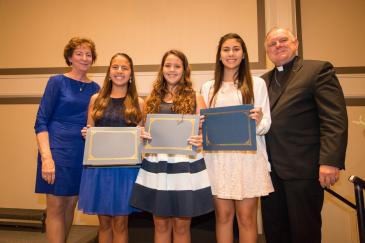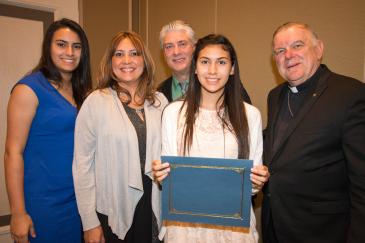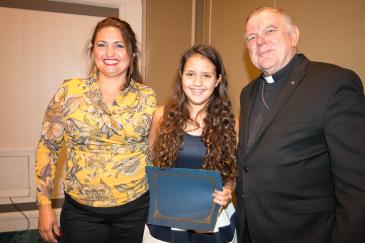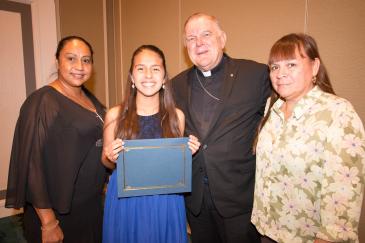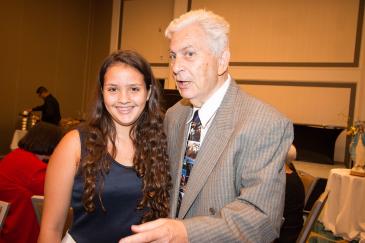By Ana Rodriguez Soto - Florida Catholic newspaper
Photography: ANA RODRIGUEZ-SOTO | FC
MIAMI | Rose Manni — whom friends describe as “91 going on 19” — says she regularly gets scolded by her son for spending too much time on the phone.
“I can get hold of the president better than I can get a hold of you!” he tells her.
When she’s not on the phone, the St. Gabriel parishioner is turning pillowcases into sundresses for children in Haiti and Africa. Or she’s “taking the bull by the horns” and cleaning the oven in the parish kitchen — although that proved a bit awkward.
“I’m in there with shorts on, my rear sticking out and Father comes in,” she said, referring to St. Gabriel’s pastor, Father Anthony Mulderry. “I almost put the gas on, I was so embarrassed.”
Manni told the story after having been named the 2015 Outstanding Member of the Miami Archdiocesan Council of Catholic Women. She and Jean Harum, a founding member of St. Thomas the Apostle parish and women’s council, were feted at the MACCW’s annual convention, held May 1-3 in Miami. Harum received the group’s top honor, the Our Lady of Good Counsel Award.
Both are grandmothers (Manni is a great grandmother). Both are active in their churches and committed to their faith. Both spent the better part of their lives working at home: cooking, cleaning and sewing for their husbands and children.
Those qualities make them the stereotypical members of church women’s groups. But they also make them a force to be reckoned with.
During their convention weekend alone, the members of the MACCW handed out $15,000 in scholarships for eighth-grade girls and $3,500 for the education of seminarians. They also made over 30 pillowcase dresses for poor children and knotted a quilted “prayer square” for a mother with cancer.
In Harum’s council alone, the women’s annual tally of work included: sending 300 birthing kits (scissors, sanitary wipes, sterile gloves and pads) to women in the Congo and Haiti who have no access to medical care, so they can give birth safely at home; collecting 20 boxes of toiletries for homeless veterans and their families; and distributing $4,000 worth of toys for 90 children who get help at the shelter for homeless women run by the Missionaries of Charity in Miami.
Multiply that times 28 — the number of parish women’s groups affiliated with the archdiocesan council — to tally the impact of their work.
“Women want a place to go but they want to do something good, too,” said Harum.
She remembers the “cookie-cutter” days when council members were stay-at-home moms with working husbands and two to four children.
“We wore hats and gloves. That’s how long ago,” said the 81-year-old, who arrived in Miami from her native Cleveland in the late 1950s with her lawyer-husband (and eventually four children, one of whom is now a judge).
“Everyone was from Alabama and they went to the Baptist church,” she remembers. “I needed to be part of Catholic life.”
So she became one of the pioneer founders of St. Thomas the Apostle Parish, setting up the altar each Sunday at a local public high school and frying freshly caught dolphin and hush puppies twice a year at the church fish fries.
The parish was founded in 1959, and the women’s council held its first meeting in 1960. “It gave us Catholic women an opportunity to really be a Catholic, and to follow what is our vocation, to evangelize,” Harum said.
She noted that the only thing different today is the dynamic, with young members who are architects, engineers and single mothers.
But the purpose of a women’s group remains the same, she said: “We’re supposed to spread the Good News. Give people hope and opportunities to experience love and to grow in their faith. That’s the only way it happens, you know?”
“I may, in all humility, reach more people in a week than a monsignor,” said Rosi Schuhmacher, president of the Florida Council of Catholic Women and director of the Miami Province.
Schuhmacher started out with the Miami council when she was a member of Christ the King Parish in Perrine. That was 37 years ago “and I never looked back,” she said.
A widow now and childless, she moved to Daytona Beach for a career opportunity some years back. She is now executive director of a Chamber of Commerce. But her involvement in the council continues.
She describes the group as “the CIA of the Catholic Church: Christianity in Action.”
“Everything we do falls under the corporal works of mercy,” Schuhmacher said.
The Florida council which she heads is composed of the seven diocesan councils, which in turn are made up of individual parish councils.
Most archdiocesan parishes have women’s groups but many are not affiliated with the MACCW and its umbrella organization, the National Council of Catholic Women. The NCCW was founded by the U.S. bishops in 1920 as a way of bringing women together and engaging in social service.
“The NCCW is basically to unite women with one voice,” said Schuhmacher, a Brooklyn native who describes herself as “very opinionated. You can ask any of the bishops.”
“If ever there was a time for women to unite with one voice it would be now, when Christianity is under attack in our country and the world,” she said. “We need that strong voice supporting the bishops of this country and the Catholic values we are supposed to adhere to.”
The national group takes part in the annual March for Life in Washington, D.C. and is a member of the World Union of Catholic Women’s Organizations, which is recognized by both the Holy See and the United Nations.
Among the projects organized by the Florida council are the annual Catholic Days at the Capitol and the Hugs for the Homeless campaign, when women fan out in public places exchanging Hershey’s Hugs for donations to help homeless shelters throughout the state.
Unfortunately, much of the women’s work — like that of mothers and wives — takes place behind the scenes: the pillars no one sees holding up the building.
Membership in the council is waning, as it is in most other civic and religious organizations. In the archdiocese, council members have been trying for years to attract younger women and diversify culturally.
But they are fighting societal trends such as the rise of the “nones” — younger generations with no religious affiliation — and the technology-fueled, disconnected frenzy of modern life.
Like other council members, Schuhmacher remains hopeful, and true to her convictions. “If we do everything with the love of Christ, we couldn’t help but increase our membership tenfold,” she said.
Corrected May 21: Rosi Schuhmacher's name is now spelled correctly.
